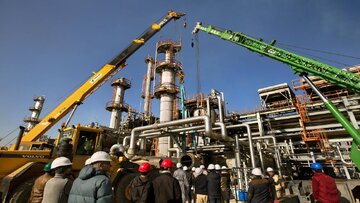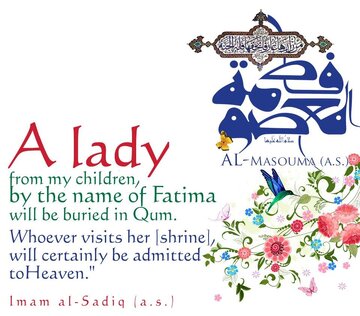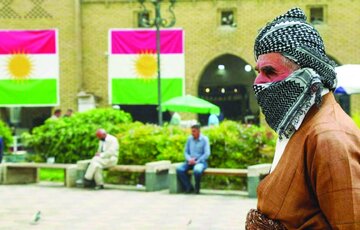AhlulBayt News Agency (ABNA): In 2011 when the young Tunisian street vendor Mohammad Bouazizi set himself on fire, he triggered strong waves of anti-government protests in his country and inspired others in the Arab world. These protests with a popular nature were insistent on toppling the dictatorships and forming democratic political systems. Dubbed Arab spring, Arab uprisings, and Islamic awakening, these movements seriously questioned the credibility of theory about Middle East exception from reaching democracy and thus grabbed regional and international attention.
Meanwhile, in Bahrain, at the same time with the beginning of protests in countries such as Tunisia, Egypt, and Libya, popular protests against the Al Khalifa regime began on February 14, 2011 and on February 22 of the same year, more than 100,000 protesters gathered in Pearl Square in the capital Manama.
The revolutionary movement of the Bahraini people, however, was suppressed with an iron fist by the government and did not succeed in achieving the goals for which it began. Now, after a decade, the regime has failed to regain its lost legitimacy, and the anniversary of the uprising is marked in a heavy and policized atmosphere where freedoms are restricted.
Shedding light on the various dimensions of the Bahraini protest movement over the past decade is our subject here.
Roots and causes of Bahrain uprising
Bahrain's February 14, 2011 uprising began as 70 percent of the country's population is Shiite and lives under the authoritarian rule of the Al Khalifa Sunni minority. The structure of government in this country is hereditary, and this has led the majority of the population, which suffers under discriminatory Al Khalifa dictatorship, to always object to the family rule. The protests were sporadic until 2011, but since then and along with uprisings in other Arab states, they became more serious and concentrated. The situation has been such that Western sources consider the popular revolution in Bahrain to be one of the longest and most peaceful protests in the Arab world.
In examining the roots of the uprising, we need to point to an important issue: The Al Khalifa rule has always been objected to by the maximum popular disapproval because of its unpopular nature and its seizure of power through a mandate treaty with the British Empire in 1820. Also, the non-participation of Shiites in the structure of power and management, discrimination against the majority of Shiites in this country, the type of constitutional structure and the powers of the ruler which give the people no right for self-determination, the election of monarch, or even the prime minister give reason to protest. Add to this the lack of free elections and absolute monarchy. These all are the driving forces behind the uprising.
The conditions of Shiites in Bahrain
Socially, the most important problem in Bahrain is discrimination. On the one hand, discrimination between the Al Khalifa family and the ruling class with other classes, and on the other hand, widespread religious discrimination between Shiites and Sunnis. There are two different worlds in Bahrain; One is the rich world of the ruling family, diplomats and owners of foreign companies and banks, and the other is the poor world that includes people in poor neighborhoods and cities. The members of Al Khalifa family are always ahead of others in all matters, and meritocracy does not make sense in Bahraini society.
Moreover, the main discrimination in Bahraini society is discrimination against the Shiites, who have always been suspected and discriminated against by the ruling family. Politically, Sunnis are appointed to most of ministry posts, and this is while the monarchy system of Bahrain is hereditary and the king has absolute power in all matters according to the new constitution.
The main demands of the Bahraini people are return of those in exile, the release of political prisoners, the lifting of the ban on the formation of political parties and activities, freedom of expression and the press, the cessation of the arrest of pro-freedom protestors, and end of censorship. The Bahrainis revolted several times for realization of their demands. In 1938, for example, Bahraini workers demanded the formation of a parliament and trade unions, and in similar demonstrations in 1965, the right to arrange political rallies and the release of political prisoners was added to previous demands.
Meanwhile, Al Khalifa's repressive approach to the country's Shiites has made Bahrain one of the worst countries in the world in terms of human rights and social justice, as its rulers pay no attention to popular protests, civil liberties, and the rule of law, and furthermore do not fight corruption. According to international rights organizations, Bahrain fell 17 ranks in terms of public freedoms, standing among the 35 countries with black records. The abolition of all political arrests, the trial of corrupt officials and deep political reforms in this country have been among the recommendations of international organizations and rights advocacy groups to this country in order to improve the political situation in this country.
Features of Bahrain revolution
The Bahraini revolutionary movement is intellectually and ideologically based on the will for democracy and the establishment of a political system for representation of people and accountability of the government to the rule of law stemming from the will of the people and free elections. Despite the fact that the majority of the revolutionary movement in Bahrain is Shiite, the movement's aspirations are not based on sectarianism and the formation of a despotic government like the Al Khalifa regime. Rather, the fundamental goals of the revolution are justice and democracy.
Also, the revolution of the people of Bahrain was initially peaceful and focused only on political and economic reforms in this country, but after King Hamad bin Isa Al Khalifa called this it a "revolution of thugs" and ordered the suppression of the protesters, a real revolution under influence of regime's violence and suppression took place. The dominantly security approach of the government and encouragement of the regime by Saudi Arabia to crack down on the protesters turned Pearl Square a scene of crackdown, resulting in arrest, banishment, and revocation of citizenship of over 11,000 Bahrainis.
Relations of the regime and opposition over the past decade
Eleven years after the revolution, despite the efforts by protesters in the country to bring about reforms and political freedoms, in practice the process of repression of the opposition in the country has continued, the political climate changed in favor of Khalifa family and solidified the foundations of an authoritarian regime. A decade after the revolution, Al Khalifa spares no effort to suppress, weaken, or limit its critics, and in recent years has imprisoned and convicted revolutionary leaders. These actions take place while many of the leaders of the revolution have either been convicted in largely show trials and have been handed long-term sentences or sent in exile. Opposition parties, such as Al-Wefaq National Islamic Society, have been outlawed by the regime. Actually, during these years, the Bahraini government has not only been inflexible in the face of its opposition but also resorted to coercion to weaken the revolution and eliminate its leaders.
Spiritual and political leaders of the revolution
Leaders of the Bahraini revolution include Sheikh Isa Qasim, Sheikh Ali Salman, and Abdulwahab Hussein, all of whom have been imprisoned or convicted in recent years on false pretenses. Al Khalifa, for example, revoked the citizenship of Sheikh Issa Qassem, the spiritual leader of the revolution, and in 2017 sentenced him to one year suspended imprisonment and confiscation of property. Sheikh Ali Salman, leader of the Al-Wefaq, Bahrain's largest Shiite party, was sentenced to life imprisonment, a move that triggered a condemnation of the Bahraini government by the Amnesty International. Abdulwahab Hussein, the founder of Islamic Loyalty Movement and the trigger of the revolution, was handed life sentence, too.
Al Khalifa regime's policies: from suppression of the revolution to promises of uprising
Among the demands of the protesters in September 2011 were arrangement of free parliamentary elections, political reforms, and the removal of the Prime Minister Khalifa bin Salman Al Khalifa, so that a replacement to him could be elected by the people in an independent election. Following the escalation of popular protests in 2011 and the government's inability to suppress the popular uprising, Bahraini rulers made promises of political reform to protesters, and in April of that year, talks were held between the crown prince and protest leaders. Al Khalifa held elections and the formed a parliament with the aim of calming the protesters. Although this was initially approved by the Bahraini government, election fraud and engineering prevented the protesters from achieving their goals. The regime knew that if a free and independent elections is held, the Shiite majority would lead in the parliament. After months of carrot-and-stick policy, A Khalifa decisively cracked down on the opposition on the strength of the Saudi Arabia which sent troops under Peninsula Shield Force, closing the door to any progress in negotiations.
Bahrain developments' regional and international significance
Bahrain has always attracted the attention of countries such as the US and Saudi Arabia due to its strategic geographical location. In 1971, Bahrain signed a military alliance with Washington, handing over the Al-Jafir military base to the American troops. Other bases were also given to the Americans, and most importantly Bahraini is home to the US Fifth Fleet, indicating the importance of this tiny island state in the American military role in the Persian Gulf.
Also, due to its geographical proximity to the oil-rich regions of eastern Saudi Arabia, the rulers of Riyadh have tried for years to maintain Bahrain as an ally, and given the majority presence of Shiites in eastern Saudi Arabia, any change in Bahraini government could become a stimulus for the Shiites of Saudi Arabia who have always been oppressed by the Saudi rulers. In addition, due to Shiite majority of Bahrain and common historical and religious backgrounds with Iran, it was possible that in the event of a political change, the country would become an ally to Iran in the future. So, Saudi Arabia and the UAE, with a green light from the US and Britain, deployed troops to Bahrain under the guise of Operation Island Shield and cracked down on protesters in order to maintain their political and military influence in the country while maintaining and supporting the Al Khalifa government.
Human rights violations in Bahrain
The Bahraini government's violent crackdown on dissidents, especially detainees, led to the formation of an inquiry commission ordered by the king. Five international lawyers and human rights experts from different countries became members of this commission. Sessions of probe yielded a report on the violent treatment of demonstrators by security forces and the violation of the fundamental rights of detainees. There were documents of widespread detention during peaceful demonstrations, ill-treatment and torture of detainees, and legal problems with judicial proceedings, arbitrary arrest of Shiite activists and killing of at least 35 people, including five government officials. Reacting to the commission's findings, the Bahraini government pledged that the events following the protests in the early months of 2011 would not be repeated and that the victims would be compensated. But 10 years after that commitment, the rulers have not only failed to fulfill any of their promises but also continued their repressive actions, escaping any international punishment.
Normalization with Israel and deepening of gap with people
Under the Donald Trump administration-sponsored Abraham Accords, some Arab countries, including Bahrain, joined the ranks of normalizing states with the Israeli regime. Bahrain was the fourth Arab country to normalize with Tel Aviv. This took place while the people of Bahrain have long supported the Palestinian cause and naturally considered the normalization deal a betrayal of this ideal. Disregard of the public regarding the Palestinian case added to the discontentment with Al Khalifa rulers. During over a year of normalization, the Bahrainis have repeatedly protested and expressed their opposition to this issue, only to be met with repression and violence by the security forces. Israeli Foreign Minister Yair Lapid visit to Bahrain in late September last year triggered protests in Sitra Island south of the capital in which people voiced their opposition to the visit and opening of Israeli embassy in Manama. Again the security forces reacted with violence, using tear gas and rubber bullets.
The outlook of the protest movement
More than ten years after the Bahraini revolution aimed at political and constitutional reforms not only the country saw no change but also the political and civil freedoms are now more restricted than ever, with the authoritarian approach of Al Khalifa and its coercive measures against critics and opposition considerably on the rise. In mid-February last year, the Manama Post news outlet reported, citing AP, the protests of the Bahraini people, which took place in 2011 for political and civil liberties and the change of political system in the country, are under brutal repression. During this period, the repression of the opposition in a variety of ways by the Al Khalifa regime in Bahrain has continued. Since 2011, Bahraini authorities have targeted not only Shiite political associations and religious leaders but also human rights activists, journalists and the Internet users, increased mass trials, dissolved political parties, and carried out widespread crackdowns on the citizens. A decade later, political and human rights activists in Bahrain and in exile say that political freedoms and civil rights in their country are much more restricted than in 2011. The Al Khalifa regime continues to clamp down on the opposition, accusing the opposition of trying to undermine the country's political system as part of a conspiracy, while the fact is that Bahrain Independent Commission of Inquiry, headed by Sharif Basyouni, and other experts found no evidence for these allegations. Still, protest activities of the people for their rights and an Islamic democracy with central role for people are ongoing as political and rights groups invite people to stability and resistance in the way to realization of their rights.
As a conclusion, after a decade, not only has the ruling regime introduced no change to its despotic rule but also continued crackdown on the pro-reform forces on the strength of military force lended by the US, Saudi Arabia, the UAE, and recently the Israeli regime. But despite its foreign-enabled success in preventing a regime change, its legitimacy and acceptance increasingly face challenges in the long run as popular protests and discontentment continue to accumulate– something making any spark in the political scene carries the potentials to spiral into a massive fire endangering Al Khalifa's very existence.
/129





